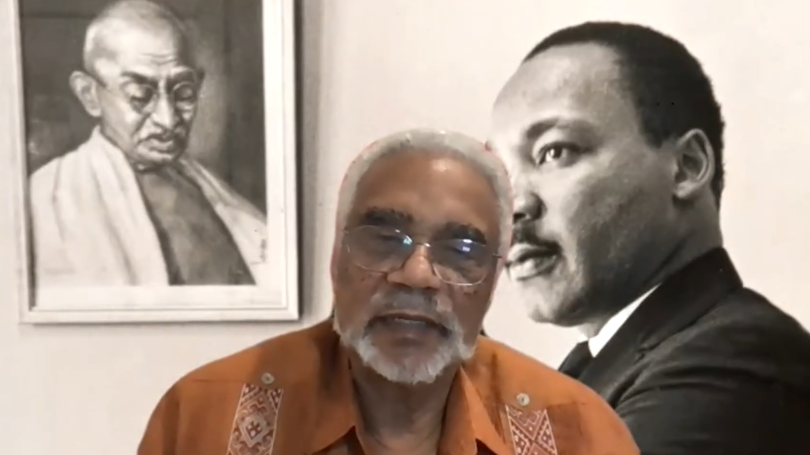
- Public Policy
- Leadership
- Funding
- News & Events
- About the Center
Back to Top Nav
Back to Top Nav
Back to Top Nav
Back to Top Nav
On January 19, 2021, Dr. Clayborne Carson, the Martin Luther King Jr. Centennial Professor of History Emeritus at Stanford University, spoke at special edition of Rocky Watch to as part of Dartmouth’s Martin Luther King, Jr. Celebration. More than 80 members of the Dartmouth community gathered via Zoom to hear Dr. Carson’s insights into the great civil rights giant as the country celebrated what would have been his 92nd birthday.
More than 35 years ago, Dr. King’s wife, Coretta Scott King, chose Dr. Carson to lead the effort to edit and publish a compilation of Dr. King’s written works. The endeavor, known as the Martin Luther King, Jr. Papers Project, has already published seven volumes of the late leader’s works, according to their website. Over 15 years ago, Dr. Carson founded the Martin Luther King, Jr. Research and Education Institute to support the Papers Project. He also offers a free online open-enrollment course on the late Dr. King and hosts The World House podcast.
Cheryl Bascomb ‘82, Vice President for Alumni Relations at Dartmouth College, facilitated the wide-ranging discussion with Dr. Carson. The two discussed the former professor’s research and writings before turning to the audience for their questions.
This past summer, in the wake of the murders of George Floyd, Ahmaud Arbery, and Breonna Taylor, Black Lives Matter protests sprung up across the nation. Unsurprisingly, for students and faculty in attendance the subject was top of mind. Many were curious how Dr. King might react to not only the protests, but also to the persistent national conversation about police brutality nearly 60 years after King he delivered his famous address at the March on Washington. As any great historian would, Dr. Carson pulled from the primary sources he has devoted his life to studying. He referenced King’s “Letter from Birmingham Jail” in a discussion about the complicity of those who King called “the white moderate”.
In what was perhaps the most revealing part of the presentation, Dr. Carson spoke about the late Coretta Scott King. Although he got to know Dr. King mostly through his speeches and sermons, Dr. Carson got to meet and learn from his wife Coretta. To many in the audience, little was known of Mrs. King. Dr. Carson spoke of her advocacy apart from her husband’s. According to him By his account, she led an entire life of activism before she met Dr. King and after his passing she continued to work to dismantle systems of oppression. Although nearly all of his work focuses on the King who has gained international recognition, Dr. Carson thought it paramount that he spoke of the integral role Coretta Scott King played before meeting her husband, during his rise to prominence, and after his assassination.
Dr. Carson believes that despite our present challenges, the work of Dr. Martin Luther King, Jr. and others has set us on a path to dismantling racist and oppressive systems. A new generation of activists will be tasked with carrying on this work, and it is critical that they take time to reflect on those who came before us, including the subject of Dr. Carson’s research and writings.
Written by Blake McGill ’22, Rockefeller Center Student Assistant for Public Programs